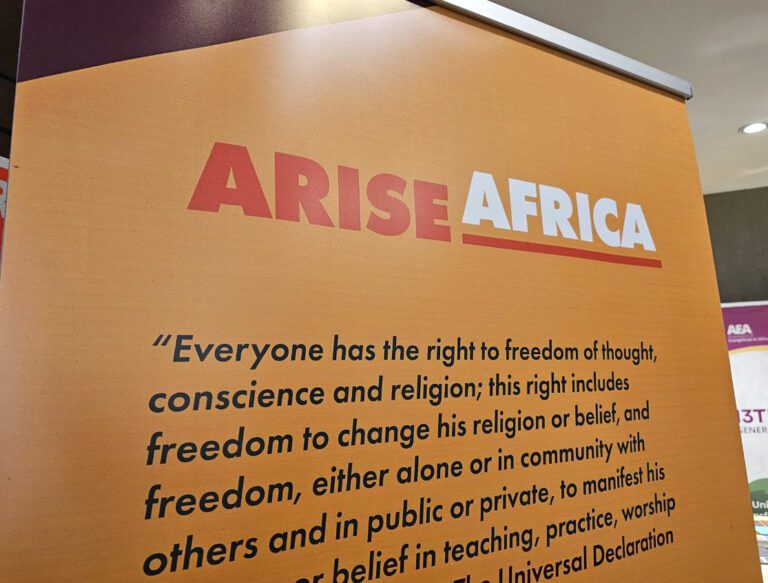A new report released by Open Doors International paints a harsh picture of the escalating persecution of Christians in Africa, particularly in the sub-Saharan region, with millions facing violence, discrimination and displacement.
The report highlights surprising statistics from the past year, including 4,476 Christians killed for faith around the world, 28,368 attacks on Christian homes and businesses, and the astounding 16 million Christians forced to be exiled for violence in sub-Saharan Africa alone.
The 2025 World Watchlist reveals that over 380 million Christians worldwide endure high levels of persecution. This has increased significantly since the past.
At the African Evangelical Association (AEA) General Assembly held in Nairobi from May 20-23, Africa’s Open Doors International Director George Williams said the situation is “incapacitating unbearable.”
The increase in persecution is attributed to a variety of factors, including extremist violence, authoritarian regimes and socio-political instability. Extremist groups such as Boko Haram and ISWAP continue to specifically target Christian communities, leading to brutal attacks and forced displacement.
A serious issue that exacerbates the situation is broad immunity for perpetrators of violence against Christians. “Many communities live in fear and are unable to return home due to lack of justice and protection from government authorities,” Williams said.
He highlighted the devastating effects of conflicts across Africa, saying that more than 35 important conflicts are now raging across the continent. As a result, more than 16 million Christians have been displaced, and an additional 74 million people are at risk if the conflict continues. Internally displaced people (IDPs) in Christian communities often face harsh reality.
The Open Doors Report 2025 World Watch list says insufficient resources and institutional discrimination will further increase the vulnerability of displaced people. For example, data from the International Organization for Migration (IOM) suggest that the number of IDPs in regions like Plateau Province is severely underreported, suggesting that aid is insufficient.
Local reports show that the IOM has documented about 54,457 IDPs in Plateau province, but local agencies estimate that the number will exceed 100,000. “This contradiction underscores the need for better assessment methodology and increased funding for IDPs, especially in areas that are often overlooked,” the report states.
Williams firsthand witnessed the immeasurable suffering of persecuted Christians, and described a particularly shocking visit to Nigeria’s evacuation camps. There, many women and children lived in miserable circumstances, often without basic sanitation and many people lived in the prominent absence of men who were killed.
Church decimation
Additionally, Williams revealed that over the past 15 to 20 years, 19,000 churches have been “destroyed” across Africa. 15,000 of the affected churches are in Nigeria. This devastation, he said, is a direct result of groups like Boko Haram, pledging to eliminate Christianity’s presence in northern Nigeria’s states and push it further south.
Williams shared the tragic testimony of a Nigerian Christian who witnessed his father and brother being killed for refusing to abandon their faith. “It’s a quiet persecution, but it still screams,” Williams highlighted the mysterious scale of mourning.
Despite immeasurable suffering, Williams spoke about the emergence of the “silent church.” They are Christians marginalized by areas that are consistently pushed to the periphery of society in areas like Sudan and Somalia.
He also highlighted the incredible growth of Africa’s “emerging churches.” It consists of underground and secret followers from Muslim backgrounds, and has over 5 million followers. In 2024 alone, more than 4,500 Christians from 12 Sahel countries were killed for their faith, 114,000 Christians were forced to evacuate, 16,000 homes were destroyed, and more than 1,700 churches were affected.
A call to action is urgent, as Williams recognizes the “lack of unity” and emphasizes the need for humility and repentance within the church itself. Williams emphasized that African churches cannot overcome these challenges with their own strength, and encourage reliance on spiritual power rather than power.
In light of the unsettling trends, Opendoor, in collaboration with the AEA, announced the African campaign. This is an initiative aimed at mobilizing Christians from around the world who are in solidarity with their persecuted counterparts in Africa.
The campaign encourages individuals and churches to be informed of Christian light letters, pray for their suffering, and defend themselves against ending violent persecution.
At the AEA General Assembly, Janet Epp Buckingham, director of the WEA Geneva office, emphasized the importance of advocacy as a long-term relational approach, urging Christian leaders to become “Esther and Daniels” who can engage with government leaders. She also highlighted the value of a multi-loyal response to persecution, noting that working with other faiths could open the door to government involvement.
